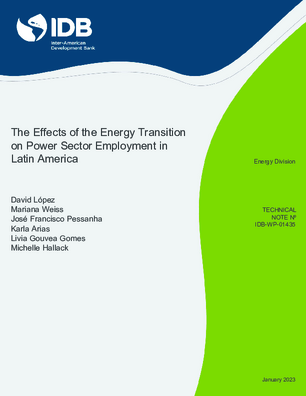The Effects of the Energy Transition on Power Sector Employment in Latin America
Date
Jan 2023
The present study analyzes the relation between energy transition and the job creation potential in Latin America. It capitalizes on companies' characteristics to infer potential hiring process drivers in forthcoming years. The analysis is based on an econometric model on cross-sectional data to explain the dependent variable "potential hiring rate" depending on the firm's size (based on the number of clients), area of activity or technology, employees' level of education, and the existence of labor policies. The data came from 338 companies interviewed, including generation, transmission, distribution, energy transition services, oil and gas, and construction companies in six Latin American Countries (Bolivia, Chile, Costa Rica, Mexico, Panama, and Uruguay). The econometric study focused on 135 companies that declared hiring new employees in the next year concerning the time they were interviewed.
The results show that the smaller energy companies with a larger participation of a qualified workforce will tend to have a higher expected hiring rate in the forthcoming year, implying an inverse relationship between a firm's size and potential hiring rate. The model findings convey that as the workforce is compounded with more qualified employees, the higher the expansion of the company's labor force will be, particularly in renewable generation companies. There is an additional aspect worth considering about the factors behind the company's potential hiring rate, and it is the question of job quality. The results suggest that firms hiring more are those with a lower number of policies in place. It can be explained by the fact that more traditional companies tend to have better-established policies, such as hydrocarbon and utilities. These are not the companies with the highest increase in the workforce. This takeaway raises a discussion about whether a change in the job's quality is associated with the energy transition or if it is just associated with new entrants that will become traditional in the following years. Moreover, it also helps to explain some of the political economies of the labor market that may play a role in the energy transition process. Therefore, one of the present study's main takeaways is the need to analyze deeper and promote job quality in smaller energy companies.
The results show that the smaller energy companies with a larger participation of a qualified workforce will tend to have a higher expected hiring rate in the forthcoming year, implying an inverse relationship between a firm's size and potential hiring rate. The model findings convey that as the workforce is compounded with more qualified employees, the higher the expansion of the company's labor force will be, particularly in renewable generation companies. There is an additional aspect worth considering about the factors behind the company's potential hiring rate, and it is the question of job quality. The results suggest that firms hiring more are those with a lower number of policies in place. It can be explained by the fact that more traditional companies tend to have better-established policies, such as hydrocarbon and utilities. These are not the companies with the highest increase in the workforce. This takeaway raises a discussion about whether a change in the job's quality is associated with the energy transition or if it is just associated with new entrants that will become traditional in the following years. Moreover, it also helps to explain some of the political economies of the labor market that may play a role in the energy transition process. Therefore, one of the present study's main takeaways is the need to analyze deeper and promote job quality in smaller energy companies.




